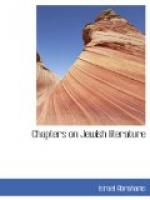Mendelssohn’s most epoch-making work was his translation of the Pentateuch into German. With this work the present history finds a natural close. Mendelssohn’s Pentateuch marks the modernization of the literature of Judaism. There was much opposition to the book, but on the other hand many Jews eagerly scanned its pages, acquired its noble diction, and committed its rhythmic eloquence to their hearts. Round Mendelssohn there clustered a band of devoted disciples, the pioneers of the new learning, the promoters of a literature of Judaism, in which the modern spirit reanimated the still living records of antiquity. There was certainly some weakness among the men and women affected by the Berlin philosopher, for some discarded all positive religion, because the master had taught that all positive religions had their saving and truthful elements.
It is not, however, the province of this sketch to trace the religious effects of the Mendelssohnian movement. Suffice it to say that, while the old Jewish conception had been that literature and life are co-extensive, Jewish literature begins with Mendelssohn to have an independent life of its own, a life of the spirit, which cannot be altogether controlled by the tribulations of material life. A physical Ghetto may once more be imposed on the Jews from without; an intellectual Ghetto imposed from within is hardly conceivable. Tolerance gave the modern spirit to Jewish literature, but intolerance cannot withdraw it.
BIBLIOGRAPHY
MOSES MENDELSSOHN.
Graetz.—V, 8.
Karpeles.—Sketch of Jewish History,
p. 93; Jewish Literature
and other Essays, p. 293.
English translations of Phaedo, Jerusalem,
and of the
Introduction to the Pentateuch
(Hebrew Review, Vol. I).
Other translations of Jerusalem were made by
M. Samuels (London,
1838) and by Isaac Leeser, the latter
published as a supplement to the
Occident, Philadelphia, 5612.
THE MENDELSSOHNIAN MOVEMENT.
Graetz.—V, 10.
INDEX
Abayi, Amora, 51.
Abba Areka, Amora, 47, 48, 51.
popularizes Jewish learning, 49.
wide outlook of, 50.
Abbahu, Amora, 48-49.
Abraham de Balmes, translator, 149.
Abraham de Porta Leone, historian, 220.
Abraham Ibn Chisdai, story by, 154-155.
Abraham Ibn Daud, historian, 213-214.
Abraham Ibn Ezra, on Kalir, 88.
life of, 115.
quotations from, 115.
activities and views of, 116, 123, 151.
Abraham Abulafia, Kabbalist, 171.
Abraham Farissol, geographer, 206.
Abraham Zacuto, historian, 216.
Abul-Faraj Harun, Karaite author, 77.
Abulwalid Merwan Ibn Janach, grammarian, 101.
works of, translated, 148.




